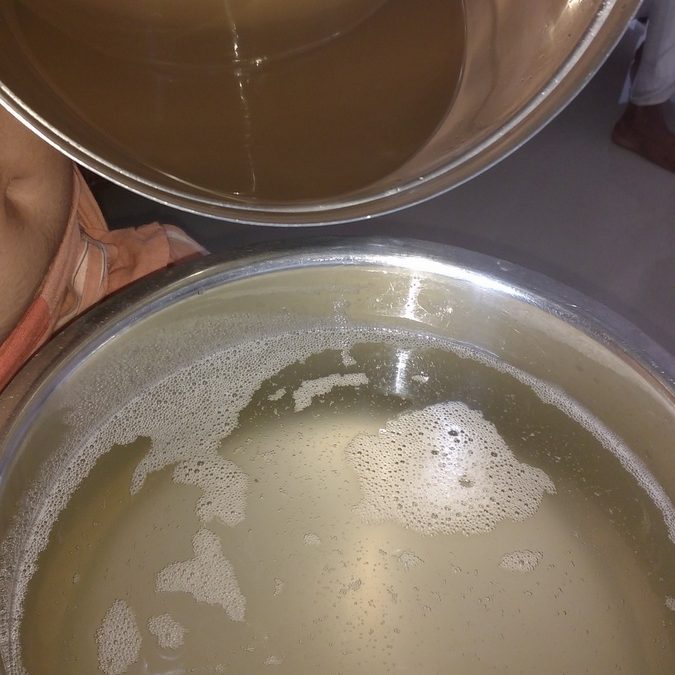How to make pure coconut oil from copra at Home

Coconut (Copra) cold press oil at home and Small mill.
Regulation and licensing doesn’t ensure purity. Even, and especially, for cooking oil. Big industries and lobbyists draft these regulations. Just like pesticides and insecticides; these things can kill humans and any other living organisms. So ideally they should be called biocides. Still it’s the other way.
Large oil manufacturers use solvent extraction and other cost-effective methods to sell in bulk. A small mill or ghani on the other hand is a service provider, not a product seller. You have to taste the oil from large manufactures and Ghani oil to know the difference. (I am aware of only one bullock operated ghani in entire Kerala). Mills may use electricity for the crushing, as bullocks are no longer feasible here. It uses the same old concept of heavy press.
Cold-pressed oil is just a latest phenomenon globally for health benefits, where as Indians have being consuming it for centuries. Lot of people are fooling and minting money. Small mills however have not gained anything out of the boom; on the other hand modi govt is under way to implement stringent law to test oil at ghani level, which will face out many more small mills. People go crazy about cold pressed virgin oil from other parts of the world, when small mills are dying out in India. Next time try purchasing oil from a local mill, instead of packed oil.

Pure Natural Kerala Coconut Oil
Small mills and ghanis generally don’t sell you oil unless you get them raw material.
How to make your own coconut oil fresh at home
Let’s see how we can make our own coconut oil from small mills. Most mills will require you to bring at least 3kg of material.
- Break open coconuts in two equal halves.
- Then let it drain water for 2 hours by placing open-side facing down.
- Make sure there is enough sunlight(never make copra during raining season). Now sundry for 3 days. Outer hard shell will come loose. Now remove the outer shell with knife or any other device. Don’t have coconuts, copras can be purchased at most grocery stores.
- Cut copra in 1 inch long and ½ inch thick pieces and let it dry for 10 to 18 days. In case of traditional bull ghani 4 days is enough as weight or compressing capacity is less. Too dry it will be a problem for them to extract oil.
- Make sure there is no dust or fungus. Good copra will have a clean off-white color.
- Store it in a good air tight container or take it to small extraction unit to extract oil immediately.
- During extraction, the oil will look filthy and full of muck. Let it settle for 1 day and you will have sparkling clean oil.
- Transfer the oil to another container making sure the bottom residue is not transferred along with good oil. Residue oil can be used for lamps or massaging on head and body.
- Creamy residue at the bottom is highly nutritious which can be used to cook gravy, chaka or eaten as it is. Make sure you finish it in less than a week.
- Add 3 to 4 pieces of salt or Black pepper to oil and keep it under sun light for a day (bull driven ghani extracts should be kept for 4 days under sun). This will extend the shelf life to almost a year.
This process is time consuming, hard work and patience. However it’s worth the effort if you care for your health and sustainable living.
Continue reading on how to make your own virgin coconut oil at home
26 Replies to “How to make pure coconut oil from copra at Home”
Comments are closed.











Hi can the oil from a wooden ghani be called virgin coconut oil?
—-
Ideally wooden ghani expelled oil cannot be called virgin. However DME process which is called virgin coconut oil is same. Grated coconut is dried on panels and oil is expelled. It sells as virgin oil in today’s market.
If ghani coconut oil is expelled in front of me; anyday i will consume it over Virgin coconut oil (VCO).
Many company are not mentioning how the virgin coconut oil (VCO) is derived. However some mention it as hot pressed and some cold pressed VCO.
DME process is one best example. This oil is ok as compared to filthy copra oil industry.
give me how to make maximum profit in copra
Hi, Your articles are always an eye opener. I’m from Tamilnadu and our family is following a similar procedure to prepare sesame oil and coconut oil. In our region people generally add lemons while grinding copra, may be for its antioxidant properties.
We use sesame oil for frying and it starts to foam while frying. Is this normal. Please suggest.
———–
Dear Karthi,
Thank you.
Water evaporates and also because of breakdown of compounds, causes the sesame oil to froth. I am not sure if its bad. I will get back if I come across.
Yes I will write something more on oil extraction. Lemon, water, cashew nut tree gum, narda valli(type of creeper). Above all materials were used as a solvent to extract more oil, way safer than today’s chemical solvent.
If you add too much of water, oil will soon turn rancid. Keep oil under sun immediately after extraction for few days. Water is added in wooden press if the nuts are too dry.
I want to know whatvis the proportion of lemon or acetic acid to be added per kilograms of copra while pressing..